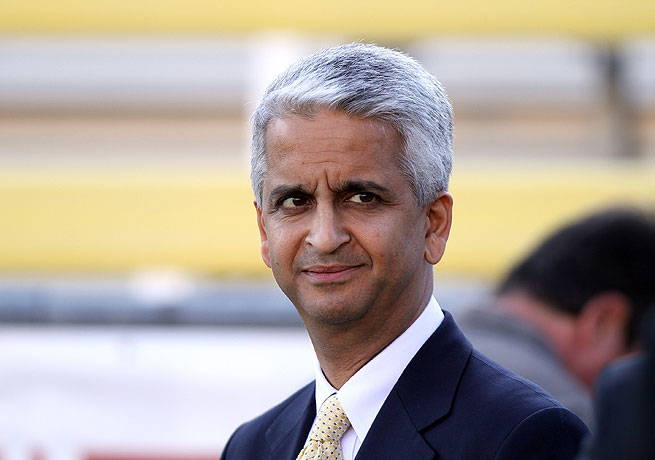By Andrew Warshaw
May 19- United States soccer chief Sunil Gulati admits the game has some way to go at professional level to reach the levels of established domestic sports like American football and baseball – and, for that matter, to match the interest in football overseas.
Gulati says his federation is doing everything it can to maximise the sport’s potential but isn’t helped by rival leagues such as England’s Premier League gaining an increasingly powerful broadcasting foothold.
Thousands of fans in the United States have bought tickets for next month’s World Cup hoping to see Jurgen Klinsmann’s team do well in Brazil. Gulati, as President of the U.S. Soccer federation, is keener than anyone to see a strong performance from his compatriots in the Group of Death that also features Germany, Portugal and Ghana.
But he paints a realistic picture of the amount of work that still needs doing at home to establish the sport in the national psyche.
“Is the Premier League the best league in the world? Year on year it’s showing more games in the US – is that good or bad for US soccer and the development of the MLS?” questions Gulati.
“If you look at the amount of money that’s being spent on television rights outside of countries, it would be pretty hard to argue that’s good. There’s not a lot we can do about it; the world is changing, technology is changing. It’s certainly good for the Premier League, but if you could just spend 5 per cent of that on your domestic league…. Recently we’ve seen that we’ve actually edged out the Premier League for domestic rights in the US versus what NBC pays the Premier League. That’s a good thing in my view but it’s taken 19 years.”
Gulati’s remarks, made at last week’s Asian Soccerex Forum on the edge of the Dead Sea, were timely in the extreme with the World Cup just a month away.
On the pitch and off it, the game has made great strides in the United States following its hosting of the 1994 World Cup and Klinsmann’s team are currently 14th in the world rankings. But playing in the Concacaf qualifying competiton, when they are invariably a big fish a small pool, does not provide the kind of top-class quality opposition needed to challenge their ability.
Providing a telling and candid insight into football’s overall place in US sport, Gulati admits it is still a work in progress even though it is the preferred sport of millions of boys and girls at high-school level.
“We’re a long way behind the likes of Brazil, Germany, England and so on. The one word that is always at the top is patience, and it’s taken a long time and we’re not near where we want to be.”
“The World Cup comes along every four years so you can’t rely on that. It’s taken a long time and we’ve made great progress but when we compare ourselves to let’s say American Football, there’s no comparison, and baseball in most cases.”
Whilst the United States will enjoy a sizeable following in Brazil, at home on television there will not be quite the same obsession as in many countries.
“We still have a very long way to go,” said Gulati. “In a few weeks the country will be focused on the World Cup but not in the way England will be focused on the World Cup. It will be millions of people watching but it won’t be tens of millions of people, it won’t be a 50 or 60 per cent share in the United States where it might be in some countries.
“So (we have) a long way to go, a long, long, hard process with failures on the way. But we’ve got some advantages. We’ve got a country of 320 million people …. We’ve got the resources to have 13 soccer specific stadiums with capacities of 25-35,000 with some of the best facilities in the world with all the amenities you would expect. These days you have to treat fans like customers and we can do that.”
“The US team has now qualified for seven straight World Cups. But to get to the promised land, all the way up, takes a lot of work.”

